|
De Iraanse dichteres, vertaalster en mensenrechten-advocate Sheema Kalbasi werd geboren op 20 november 1972 in Teheran. Zie ook alle tags voor Sheema Kalbasi op dit blog.
Middle East
I dreamt that I was innocent
my naked skin
in touch with reality
and my soul was in search
to hear your -worldly- murmur: Peace
I offered you my love
wrapped in honesty
(pure to catch up with you)
shrunk with disbelief
I -asking you: Know me
with your gorgeousness
as you played with the waves
breaking one after another
taking them into your hands
touching them one after another
I wanted to be called with your name: just
what color was Peace?
the one you chose to paint me?
the one you narrowed into my heart and nested in my grave,
what color was it?
I am longing in my grave
to receive the flowers
with your hand written note: rest-in-peace- Middle East
5.7
I don’t care if you are you and I am I. I am not some exotic flower. Whatever coat you have on, I will put it on to warm me… and the shoes however small… I will walk in them to balance our height difference. You don’t need to convert for me; I have already converted to you. You see I never had a religion to begin with. I was born naked from all religions but your love.
I know that was not the point. I know there is no conversion. There is no coat, no balance, no shoes but the naked truth of me finding you first, not you finding me. You, whom will never know who I was when I was sitting on the white sheets.
Y o u, not b e s i d e m e.
And the words that are already written. The words that are already said, are already felt, and are already gone.
And I try to take them back into my empty bowl of hands. To put my hands on the chest. The chest into rest. The rest in to the heart. The beat back to the soul. The soul, back to what it was before you.
Alas! I am 5.7
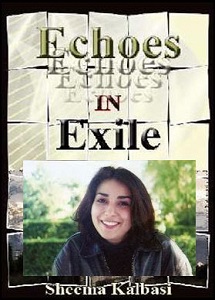
Sheema Kalbasi (Teheran, 20 november 1972)
De Zuidafrikaanse schrijfster Nadine Gordimer werd geboren op 20 november 1923 in Springs. Zie ook alle tags voor Nadine Gordimer op dit blog.
Uit: No Time Like the Present
“He can’t see far among the bodies pressed around him. There are white hands among those raised in the stomping, chanting, so he couldn’t be so noticeably there, the absorption in purpose is blindly fervent, he knows from political rallies. In the mass you have no direction of your own, he is carried along in a surge towards the main gates of the campus. Outside between the street and the gates, another gathering—a few pausing in curiosity before turning away, others, some black men and women literally throwing their yelling weight about. All cling to gates too wide, tall and strong to shake: they’ve joined the students’ action.
He tries to make a way to other parts of the campus but progress is against powerful currents as urge drives each limb of the great body to join that. He reaches only the science block from where he had set out.
Did any of his academic colleagues to whom he’d been advised to kick arse attempt to be along with the uprising against tuition fees most of their students couldn’t pay (so the cell phones worn like ear ornament, who pays for the serial calls). The faculty coffee room may say, factually, the university couldn’t exist without tuition fees to supplement the government’s inadequate grant; ‘funding free education is that government’s affair’. No dereliction of the university’s responsibility towards students?
Did he have a place down there (he’s back up at his window again). Claim it—claim on him—because of his part, his deci- sion to get mixed up in providing scientific know-how and ingredients to make bombs, his Jabu, his children gestated in a black womb. There are bonfires signalling here, there, like the Guy Fawkes ones of his childhood commemorating a revo- lutionary arson he and his siblings had never heard of. One of the bundles of whatever was being fed smoking to the flames was very near the archeological museum where tooled stones are the reminder that young men rioting are the descendants of peoples who had skills before invaders brought others; he had a sudden fear not for himself but for what is an extension of self, the work, research that was in progress in the science faculty. What if they burst into the laboratories where climate change is being studied for solutions that would save their own existence on this planet.”
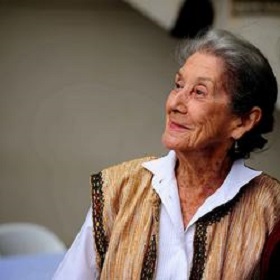
Nadine Gordimer (20 november 1923 – 13 juli 2014)
De Russische schrijfster en scenariste Viktoria Tokareva werd geboren op 20 november 1937 in Leningrad (Sint Petersburg). Zie ook alle tags voor Viktoria Tokareva op dit blog.
Uit: Korrida
“- How much does a she-goat weigh? Sixty kolograms? asked Anikee.
- I don’t know, answered Lil’ka.
- No. You weigh sixty. That’s like a pig, but a goat weighs less. About thirty kilograms. I’ll have to ask Granny Panya about that. Granny Panya! – Anikeev called out.
(...)
When he came back, he saw that Lilka was standing in jeans and wearing a coat. She was pushing the puncho “fieruchello” into a denim backpack. She also shoved the terri-cloth robe and slippers into it.
- Where are you going? –Anikeev was surprised. –To the sauna?
- I am leaving you.
- Where are you going?
- I am leaving you and never coming back.
(..)
Anikeev put his arms around Lilka’s knees and under her arms. Picked her up and grunted.
-Don’t... --Lilka became frightened. –I am heavy. Like a pig. Fifty kilograms."
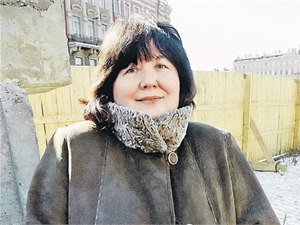
Viktoria Tokareva (Leningrad, 20 november 1937)
De Engelse dichter en schrijver Thomas Chatterton werd geboren op 20 november 1752 in Bristol als zoon van een koster. Zie ook alle tags voor Thomas Chatterton op dit blog.
February (Fragment)
Whilst Envy, on a tripod seated nigh,
In form a shoe-boy, daubs the valu'd fruit,
And darting lightnings from his vengeful eye,
Raves about Wilkes, and politics, and Bute.
Now Barry, taller than a grenadier,
Dwindles into a stripling of eighteen;
Or sabled in Othello breaks the ear,
Exerts his voice, and totters to the scene.
Now Foote, a looking-glass for all mankind,
Applies his wax to personal defects;
But leaves untouch'd the image of the mind,
His art no mental quality reflects.
Now Drury's potent kind extorts applause,
And pit, box, gallery, echo, "how divine!"
Whilst vers'd in all the drama's mystic laws,
His graceful action saves the wooden line.
Now-- but what further can the muses sing?
Now dropping particles of water fall;
Now vapours riding on the north wind's wing,
With transitory darkness shadow all.
Alas! how joyless the descriptive theme,
When sorrow on the writer's quiet preys
And like a mouse in Cheshire cheese supreme,
Devours the substance of the less'ning bays.
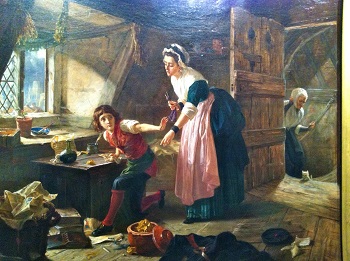
Thomas Chatterton (20 november 1752 - 5 augustus 1770)
Thomas Chatterton door Henrietta Mary Ada Ward, 1873
De Amerikaanse schrijver Don DeLillo werd op 20 november 1936 geboren in New York City als zoon van Italiaanse immigranten. Zie ook alle tags voor Don DeLillo op dit blog en ook mijn blog van 20 november 2010.
Uit: Cosmopolis
“Steam came venting from a manhole through a tall blue stack, the most common sight, he thought, but beautiful now, carrying the strangeness, the indecipherability of a thing seen new, steam heaving from the urban earth, nearly apparitional. An old industrial loft building stood on the southeast corner, 10 storeys, blocklike, a late medieval sweatshop and firetrap. There were scaled windows and scaffolding and the sidewalk was boarded off. Ibrahim nosed the car farther right, keeping a distance from closed-off areas. A vehicle pulled out in front of them, a lunch van, un- likely at this hour, one, two, three in the morning.
Then lights came on, dead ahead, flaring with a crack and whoosh, great carbon-arc floodlights that were set on tripods and rigged to lampposts. A woman in jeans appeared, flagging down the car. The intersection was soaked in vibrant light, the night abruptly alive.
People crisscrossed the streets, calling to each other or speaking into handsets, and teamsters unloaded equipment from long trucks parked on both sides of the avenue. Trailers sat in the petrol station across the street. The man in the van ahead lowered the fold-over side, for meals, and it was only now that Eric saw the heavy trolley with movable boom attached, rolling slowly into place. Installed at the high end of the boom was a platform that held a movie camera and a couple of seated men.
The crane wasn't the only thing he'd missed. When he got out of the car and moved to a spot that wasn't blocked by the lunch truck, he saw the elements of the scene in preparation.”
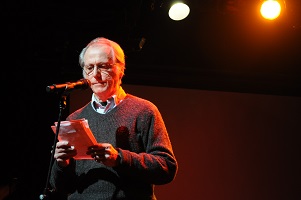
Don DeLillo (New York City, 20 november 1936)
Rectificatie
De Russische dichteres en schrijfster Zinaida Nikolaevna Hippius werd als kind van uit Duitse familie geboren op 20 november in Beljov bij Tula.(Niet op 8 november) Zie ook alle tags voor Zinaida Hippius en Zinaida Gippius op dit blog.
Zij
In haar verdorven, schamele geslepenheid
Is zij als as zo grijs, als stof is zij.
Ik sterf aan die verstikkende benepenheid,
Aan die verbondenheid van haar en mij.
Ze zit vol stekels en is niet inschikkelijk,
Gelijk een slang is zij, koud en gevlekt,
Haar kromgebogen schubben zijn verschrikkelijk
En hebben mij met wonden overdekt.
Log is ze, afgestompt en niet ontvankelijk,
O, drong een scherpe angel door tot mij!
Ze is zo lusteloos en ontoegankelijk,
Niet te benaderen en doof is zij.
Ze kronkelt vleiend rond me, de aanhalige,
Ze smoort me haast, dit duistere reptiel.
En dit vasthoudende, en dit onzalige,
Dit angstaanjagende - dat is mijn ziel!
Vertaald door Mieke en Mouring Lindenburg
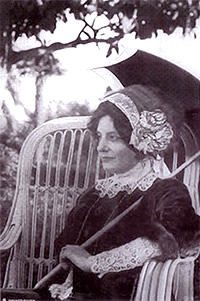
Zinaida Hippius (20 november 1869 - 9 september 1945)
Zie voor nog meer schrijvers van de 20e november ook mijn blog van 20 november 2011 deel 1 en eveneens deel 2.
20-11-2014 om 19:54
geschreven door Romenu 
Tags:Sheema Kalbasi , Nadine Gordimer, Viktoria Tokareva, Thomas Chatterton, Don DeLillo, Zinaida Hippius, Romenu
|

